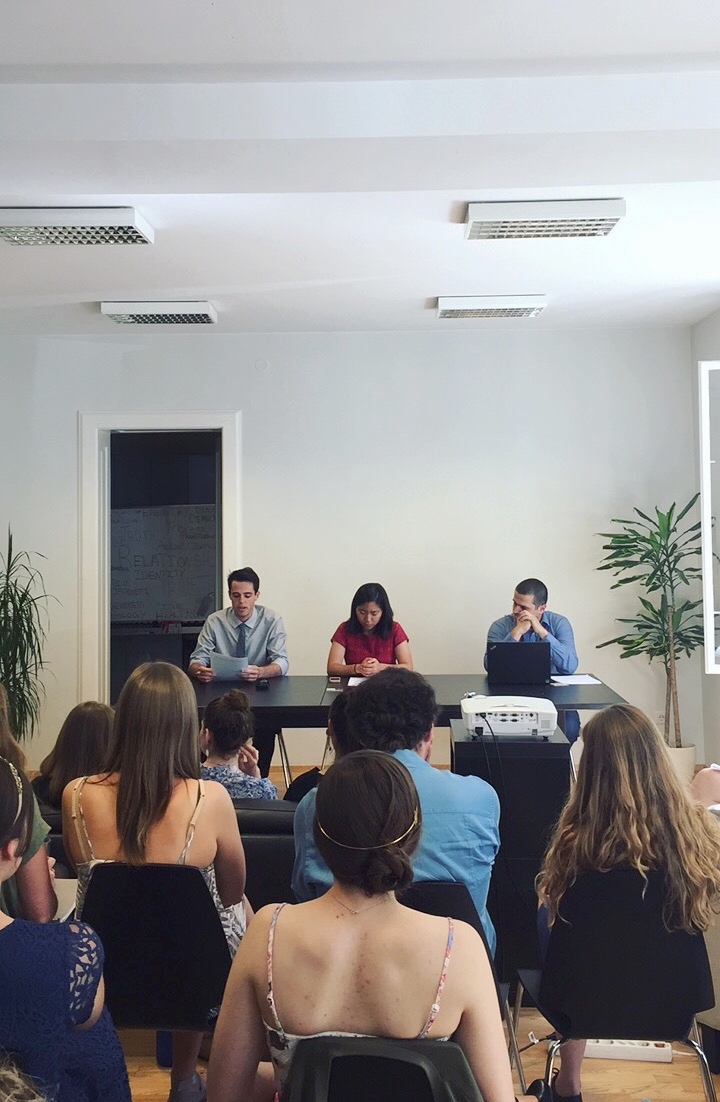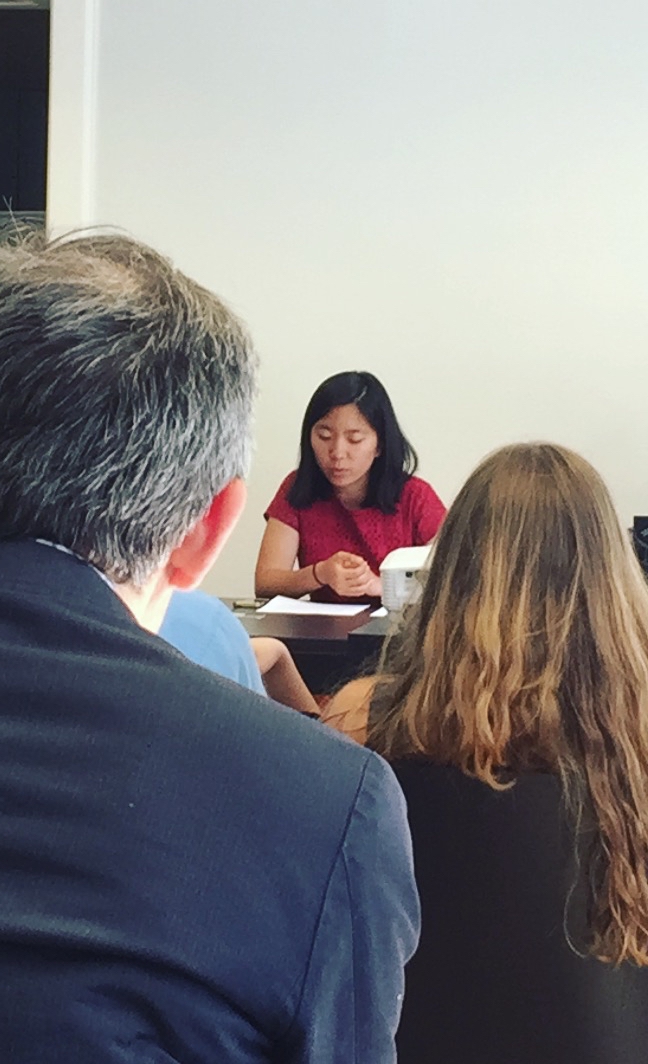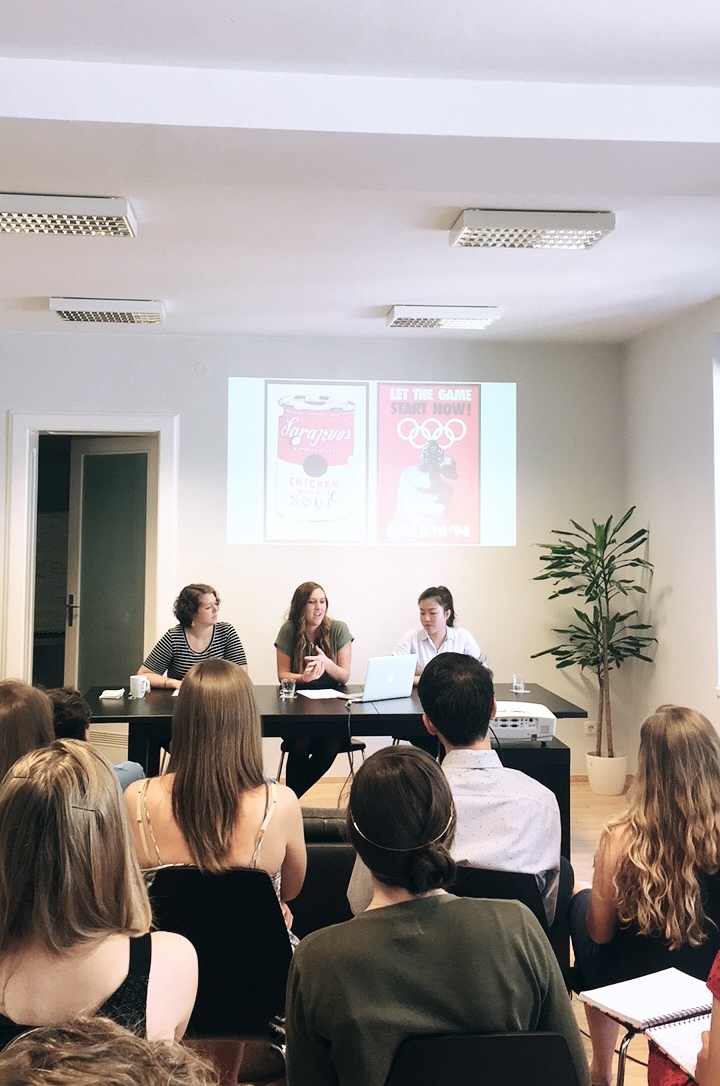At the conclusion of every Balkans Semester for the Study of War and Peace program, we host a conference at which students and faculty fellows present on a topic relating to the conference theme. Last week was our 5th Balkans Semester for the Study of War and Peace conference. This year's theme was "Engaging Violence: an Interdisciplinary Response" and students were asked to respond to the question: "How do we respond to violence?"
Our conference spanned two days with 16 student and five faculty fellow presentations. Student and faculty presentations were rigorously argued but also--due to the nature of the guiding question--personal. Students drew from their interests and experiences throughout the semester to present on topics including the place of art in violence, the process of mourning and lament, comparing the theories of pacifism and just war, the purpose of memorials, trauma and healing, empathy, atonement, and more. Faculty contributed to the conference by expounding on the sermon on the mount, race relations, hosting the stranger, translation, and the voice of marginal groups in social change.
Below are excerpts of various student papers:
"As For Me: The Challenge of Asymmetrical Pacifism" - Katy Lambert, Gordon College '18
"Therefore, I know I will sometimes fail at being a peacemaker but I still believe that only peace can free us from violence. The peace that I am compelled to act in seeks to recognize all of the complications with pacifism such as its passivity and idealistic nature, as well the fact that it might be easier for me to claim pacifism because I am often outside the realm of severe violence. I have found that there are logical explanations for both peace and just violence but I am compelled more by peace.
The purpose of pacifism, in the way I have come to define it, is to resist violence with nonviolence in hope that a perpetrator takes the opportunity to contemplate their violent act. When a victim of violence chooses not to retaliate in violence, the perpetrator is left with the opportunity to contemplate their own violent impulse because the cycle of violence has been interrupted. This does not mean that every time the cycle is interrupted someone sees the error of their ways and chooses pacifism instead, if that were the case perhaps pacifism could be perfectly realistic. Rather, pacifism allows for the interruption of violence which does not guarantee an end to violence but allows an option other than reciprocal violence. Perhaps believing that pacifism can occur universally appears to be unrealistic but I find that it is just as unrealistic to believe that acting in violence can bring about an end to violence. My conviction in pacifism is that even if it can’t end violence for every person affected by it, and even if it is unlikely that responding in peace will always end violence, it still matters solely because the choice to act nonviolent is revealed"
"Mourning as a First Response" - Tanner Begin, Westmont College '18
"Jesus as the innocent scapegoat is not the only revelatory aspect of his life. His ability to profoundly mourn the pervasive injustices of the world has brought about an entirely new revelation of truth and justice. Jesus’s life, death, and resurrection has positioned us directly in the middle of eschatological tension, between the old eschaton and the new, between violence and peace, between the finite and the infinite. Jesus’s entire life is the ultimate example of mourning. It guides us in the direction of how we should respond to violence and how we can actively live our lives in order to bring about the Kingdom"
"Just Causes: an Impossible Translation" - Kyle Johnston, Wheaton College '18
"To go to war justly, the motives behind it must also be just. In doing so, one must know ahead of time what must be done post-war in order to bring about justice and peace. This requires a knowledge of what the underlying causes behind the war are. To understand these causes requires what Ricoeur refers to as hospitality, which includes translation—the ability to take something from one context and put it into another so that the “other” can be understood. However, this translation can never be perfect and whole in its understanding and as such a “just war” is impossible and the only response to violence is through non-violent means"
"Violence Without Vengeance" - Nathanael Greene, Gordon College '18
"Too often after a war, in my view, the victors are too lenient with their defeated enemy, not too harsh. Fatigued by the material and psychological strain of prolonged warfare, the victors naively believe that they have settled the issue that prompted the war by their victory, and that the prewar status quo can be resumed, with the war considered as little more than an unfortunate ellipsis. This belief is an illusion, and the pursuit of a postwar course of action founded on this illusion will almost certainly lead to the recurrence of war. In reality, the defeated party is unlikely to accept their defeat and will attempt to reverse the outcome of the war at the first practical opportunity. The victors of war, then, have a moral duty to recognize this unstable state of affairs and take the steps necessary to remove as much of the possibility for the recurrence of violence as they can"
"Breaking Vengeance: the Pursuit of Empathy" - Brooke McGeorge, Gordon College '19
"Now, certainly we must acknowledge that empathy feels impossible; it is messy, and there is no getting around that. Empathy in full cannot happen; there can never be a perfect witness. But in the same way that it is worth it to translate even when you can’t do total justice to either language, and that it is still worth it to talk and communicate with one another though there is always the risk of offending, attempting empathy is worth it too, even though I can never be the Other. We can, and should, make strides to understand the people who are also a part of this absurd and wacky existence. Taylor, in Hosting the Stranger, acknowledges the reality of this and asserts that sometimes a translator must sometimes “fail in order to succeed.” He says that this can help us to let our limited perceptions of the world die and to make space for a much more generous view of or our existence through learning from the stranger, or the Other, and making space for them in ourselves. It is too easy to get caught up in this game that Weil helps us to understand, in which we are the game pieces, the pawns, not the players, pitted against one another and moved around on different teams not of our choosing. We have been tricked into thinking that the game is our own, that we are the ones making the moves and calling the shots, but what if we’re just the ones doing the shooting? We think we really believe in these moves we are making when we strike a dominating blow against our opponent, the Other, but something changes when we attempt empathy with the Other. Empathy is the thing that allows us to step off of the game board because it reveals the game precisely for what it is. The Other is a game piece too, and thus, our fight is most certainly not against one another. Life may pit us against one another, human vs human, giving us the illusion that the Other is alien and evil, but truly, we are all on the same side. When we attempt empathy, this process of understanding Others for who they are confronts us with a powerful sort of cognitive dissonance about our own life, identity, and purpose. It demands that I pause and think critically about my arbitrary position in the world and to reconsider the Other as not so different from me in the grand scheme of life. Weil says that 'The purest form of triumph of love, the crowning grace of war, is the friendship that floods the hearts of mortal enemies.' This is achieved through empathy"
See more from our conference and other activities on our instagram @ecswp








